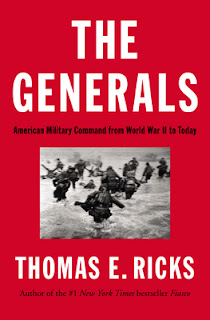I find Thomas E. Ricks'
Best Defense blog an indispensable window on the thinking of reflective members of the U.S. military. So I was happy to give a try to his current book,
The Generals: American Military Command from World War II to Today.
Ricks maintains that, subsequent to the tenure of Gen. George Marshall as Army Chief of Staff during World War II, the U.S. military has neglected to remove generals and other officers who fail -- and consequently, despite its vast armament and reputation, is an inefficient and ineffective institution.
From where I sit, the reason that good generalship seems to have disappeared in that period is so obvious as almost not to require mentioning: when generals are asked to fight illegitimate, misbegotten, immoral imperial wars, they are not going to be models of good leadership. If, in retrospect, the generals of World War II look "good," this is because they fought what is remembered as the "good war." Simplistic? Maybe, but this perspective makes sense of a lot. Ricks' account actually provides evidence for this point of view, if only obliquely.
In World War II, General Marshall used a quick hook on generals who weren't succeeding as a
political act, making a statement to both insiders and outsiders about the nature and responsibilities of the U.S. military. It was, as FDR once remarked, "a New Deal war." To Marshall's eye, being willing to remove an officer signaled to the American people that the Army's leaders cared more about the hordes of enlisted soldiers than about the relatively small officer corps. …Looking out for the common soldier was not an insignificant consideration in a war being fought for democracy …
If the masses of draftees were to continue to believe in the fight, they needed confidence that their leaders were accountable.
Ricks thinks general officers formed in the World War II mode changed the subsequent trajectories of military men in U.S. civilian politics, in a direction that has been good for democracy.
… Marshall's insistence on grooming a certain type of general might have had a less direct political effect: that of encouraging the decline in American life of the caudillo, the "man on a white horse" tendency of military leaders to move from the armed forces into political life. There was a strong tradition of elevating a general to the presidency in eighteenth- and nineteenth-century America, beginning with George Washington. … But since Benjamin Harrison, who for a few months at the end of the Civil War was a brigadier in the Army of the Cumberland and who won the White House in 1888, only one general has been elected to the presidency, and that last general to become president was the least coup-prone of officers: Eisenhower, Marshall's protege. The Marshall template, with its studied distance from politics, may have put a stake through the heart of the general as politician. Since Eisenhower, generals who have toyed with running for president have been humiliated in the primaries, emerging from the experience somehow diminished in the public eye. …
Yes, Alexander Haig and Wesley Clark took a beating. I was worried for awhile that we were seeing a politically ambitious general in David Petraeus -- who Ricks has largely approved of -- but that one seems to have blown his chance.
Ricks writes that by the Korean War, the Army had turned inward, to the detriment of the ordinary soldiers. We've largely forgotten what a terribly mismanaged horror that experience was for the draftees who fought and died in it. (I recommend David Halberstam's
The Longest Winter to anyone interested; I don't know of any accounts from a Korean perspective.) Here's Ricks on Korea:
In reading histories of the Korean War, when new regimental and division commanders are discussed, it is striking how often they are introduced with phrases such as "had not previously led troops in combat." Instead they had spent World War II in the Pentagon war-planning division, or had trained troops, or had been a staff planner in the Mediterranean Theater, or had been a corps chief of staff. … Trying to be fair to officers can be lethal to the soldiers they lead on the battlefield. The Army was using the Korean War to give the staff officers of the earlier war "their chance" to command in combat -- with disastrous results.
Not surprisingly, when Asians proved fierce opponents (to the surprise of many of these unprepared and racist officers,) U.S. citizens at home lost interest in providing cannon fodder to under-formed commanders.
Ricks thinks very poorly of U.S. generals in Vietnam (remember My Lai?), Gulf War I, Iraq, and Afghanistan, but I am not going to run through his catalogue of their failings here. I just want to highlight his conclusion which takes me back to my instinctive sense of why generals in World War II were successful -- and in subsequent wars they were not:
… the American military, as of mid-20l2, has not steeled itself and launched a soul-searching review of its performance in Iraq and Afghanistan. Without such a no-holds-barred examination, akin to the Army review of the state of its officer corps conducted as the Vietnam War wound down, it might not do much better the next time it goes to war. But as long as it cares more about not embarrassing generals than it does about taking care of soldiers, it is unlikely to undertake such a review.
Democratic nations hold their military officers accountable; in decaying empires, the officers think the military exists from their benefit -- in the language of a post Vietnam report the author cites, for "Me, my ass and my career." If we expect to have better generals, we'll have to avoid dumb, illegitimate wars. We, the civilians, are responsible for that very difficult project.










































